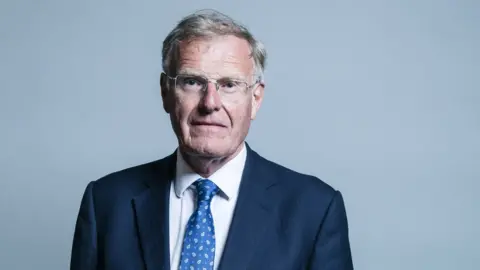Upskirting row: MP Sir Christopher Chope says he supports ban
 UK Parliament
UK ParliamentThe Conservative MP who blocked a bill that would have made "upskirting" a criminal offence has said he "wholeheartedly" supports such a law.
Had the law passed, someone secretly taking a photo up a woman's skirt could have faced up to two years in prison.
Speaking to his local paper, the Bournemouth Echo, Sir Christopher Chope said he was objecting to parliamentary procedure rather than the law itself.
The Christchurch MP said he was not "a dinosaur" and was being "scapegoated".
Prime Minister Theresa May said she was "disappointed" that one of her own MPs had prevented the bill from progressing.
She added that she wanted to see the measures passed soon.
Sir Christopher said upskirting was "vulgar, humiliating and unacceptable" and said accusations he was "some kind of pervert" were "a complete travesty of the truth".
"It's defamatory of my character and it's very depressing some of my colleagues have been perpetuating that in the past 48 hours," he added.
He explained that he stopped the bill from progressing because he disapproved of how the legislation was being brought in.
"The government has been hijacking time that is rightfully that of backbenchers," he said.
"This is about who controls the House of Commons on Fridays and that's where I am coming from."
He accused the government of trying to "bring in what it wants on the nod", adding: "We don't quite live in the Putin era yet."
'Shame'
The bill was expected to sail through the Commons on Friday, but parliamentary rules mean it only required one MP to shout "object" to block its progress.
Sir Christopher's intervention was met with shouts of "shame" from other MPs.
His actions were attacked by MPs - many from his own party.
Scottish Conservative MP Paul Masterton said the intervention did "damage" to the public's view of the party.
What is the current law?
- There is no law specifically naming and banning upskirting in England and Wales - victims and police are currently only able to pursue offences of outraging public decency or as a crime of voyeurism
- Upskirting has been an offence in Scotland since 2010 when it was listed under the broadened definition of voyeurism
What are the limitations of the current situation in England and Wales?
- Voyeurism only applies to filming actions taking place in private
- Outraging public decency usually requires someone to have witnessed the action but upskirting is often unobserved
- Unlike other sexual offences, people don't have an automatic right to anonymity
What does the new law propose?
- As well as carrying a maximum two-year sentence, it would also allow, in the most serious cases, those convicted to be placed on the sex offenders register
